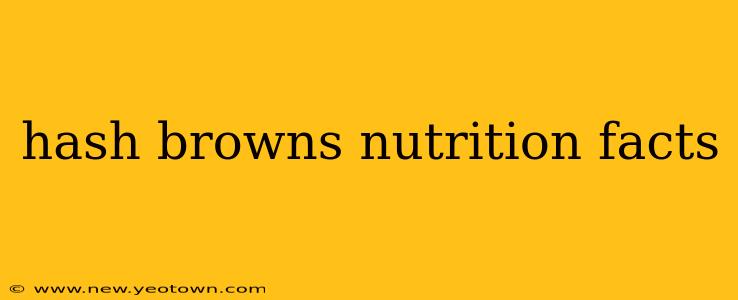Hash browns. The crispy, golden-brown delight that often graces our plates alongside eggs and bacon. But beyond the deliciousness, what's the real nutritional story behind this breakfast staple? Let's delve into the world of hash browns, exploring their nutritional facts and answering some frequently asked questions.
Our journey begins with a simple truth: the nutritional content of hash browns can vary dramatically depending on several factors. Are they made from scratch with simple potatoes? Or are they pre-made, possibly laden with extra fats and oils? Are they loaded with cheese, bacon bits, or other additions? These choices significantly impact the final nutritional profile.
What are the nutritional benefits of hash browns?
While not typically considered a health food powerhouse, hash browns can offer some nutritional benefits, especially when prepared simply. Potatoes are a good source of potassium, an essential mineral for maintaining healthy blood pressure. They also contain some vitamin C and fiber, although processing and cooking methods can affect these levels. The fiber content, in particular, is reduced when potatoes are shredded and fried.
How many calories are in hash browns?
The calorie count in hash browns is highly variable. A single serving of home-style hash browns, made with just potatoes and a minimal amount of oil, might contain around 150-200 calories. However, restaurant versions or those made with added fats and ingredients can easily exceed 300-400 calories per serving, and sometimes even more! Always check restaurant nutrition information if available.
Are hash browns healthy?
This is a complex question. The answer isn't a simple "yes" or "no." Hash browns made from scratch with minimal oil and without added ingredients can be part of a balanced diet. However, frequently consuming heavily processed or restaurant-style hash browns loaded with extra fats, salt, and calories is not advisable for maintaining good health. Moderation is key, as with most foods.
Are hash browns high in carbs?
Yes, hash browns are relatively high in carbohydrates. Potatoes are a starchy vegetable, and the carbohydrate content is concentrated when they are shredded and cooked. This makes them a significant source of carbohydrates in your diet. This isn't necessarily bad if you're getting your carbs from whole, unprocessed sources and maintaining a balanced diet.
What are the ingredients in hash browns?
The simplest hash browns consist only of potatoes, salt, and pepper. However, many versions include additional ingredients such as onions, garlic, cheese, bacon, or other seasonings. Processed hash browns frequently contain added oils, preservatives, and other additives. Always check the ingredient list on pre-packaged products.
How many grams of fat are in hash browns?
The fat content in hash browns greatly depends on the preparation method and added ingredients. Home-style hash browns made with a minimal amount of oil will have a lower fat content compared to those deep-fried or loaded with cheese and bacon. Restaurant versions often have significantly higher fat content due to cooking oils and added ingredients.
Conclusion: Enjoy in Moderation
Hash browns, in their simplest form, can offer some nutritional value. However, it's crucial to be mindful of the preparation method and added ingredients to make informed choices about their place in your diet. Opting for home-cooked versions with minimal added oil and avoiding frequent consumption of heavily processed or restaurant versions will help ensure you're enjoying this delicious breakfast treat responsibly. Remember, balance and moderation are key to a healthy lifestyle!

